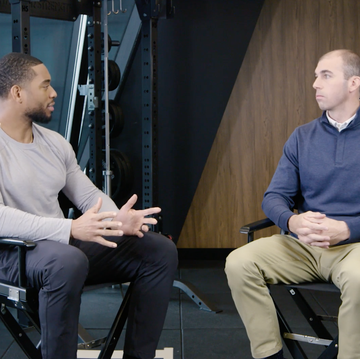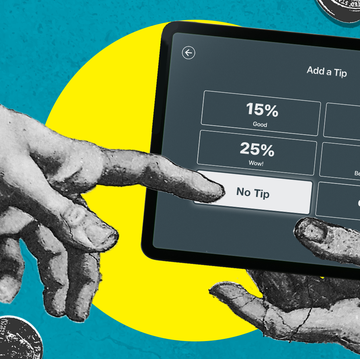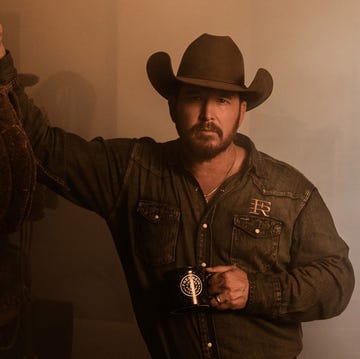Here’s a thought, not that radical: maybe every combat veteran returning from Iraq and Afghanistan isn’t cut out for college.
Maybe he or she would better off opening a tire shop, or a gin mill, or a gun store, or a burger joint.
I sure know people like that. Bet you do, too.
But those vets who aren’t cut out for college? Who just might get themselves off the unemployment line and into the workforce by owning their own business but who don’t have the start-up cash? You know what those vets are? I believe the formal term is, shit out of luck.
But maybe not for long.
“These young vets who choose not to attend college or trade school, particularly the ones who want to own their own businesses, are shut out from the benefits they earned fighting and risking their lives for all of us back home here,” the retired Marine Corps Major Lynn Lowder tells me when I ring him up. “It’s not fair. And we intend to do something about it.”
In fact, it’s been over a year now since Lowder got this particular bee in his bonnet and founded the organization “1 Vet At A Time” in order to lobby for modifications in the way the GI Bill distributes veterans benefits. A successful 69-year-old businessman who once led a Marine Recon team in Vietnam, Lowder tells me that, in his opinion, the current veterans benefit plans are all well and good so far as they go … but that they don’t go far enough.
Here’s the way he lays it out: The unemployment rate for our 2.5 million Iraq and Afghanistan veterans hovers near 2 full percentage points above the nation’s 6.1% national unemployment number. And with more than another million men and women expected to separate from the services within the next five years, “one can easily imagine that veterans’ unemployment figure soaring into the double digits.”
Currently, Lowder explains to me, there are three pathways for veterans exiting active duty and transitioning back into civilian life—attend college, enter the trades, or start up a small business. He admits that the post-9/11 GI Bill does a swell job of accommodating those vets who do in fact want to receive a college education or training in the trades.
“I’ve got nothing against the college clause of the GI Bill,” he says. “If you want to go, it’s an outstanding way for the government to help you along. But what if you don’t? What if you want to be in business for yourself? It’s basically, ‘Sorry, we got nothing for you.’
“So I thought about this and I said, ‘Wait a minute. Things have changed since post-World War Two, even since post-Vietnam. We need a small-business renaissance in America; we all know that we have to get the small-business base built back up in this country. So our thinking is, maybe we could tap in to GI Bill allocations to get these guys up on their feet as entrepreneurs, as small businessmen and -women.”
“I’m not talking about the retiring commissioned officers,” Lowder adds. “They’ll be okay; if they want to get a business loan they’ll figure out a way to do it. It’s the junior enlisted personnel, the ones who do the heavy lifting in combat—the lance corporals, the PFCs, the corporals. They come in without a pot to pee in, they fight, and they get out without a pot to pee in. So there’s no way they’re going to come up with the collateral to leverage a decent-size small business loan.”
Lowder calls these junior enlisted personnel the “gunsmoke bullet stoppers,” and he ought to know. He was once one himself before climbing up through the ranks. But he sees a difference between the men with whom he mustered out of the service three decades ago and the vets he meets coming home today.
“These kids coming back to the civilian world today, give them credit for smelling the coffee a lot quicker than I did,” he says. “After I retired it took me a long time, much later in life, to kind of realize how the game was played. So I know what it’s like to find your lane in life. But these kids are so much more together than my generation. They’ve got all of these people skills now. They’re focused. They’re resilient. They’re disciplined. They’re team players, loyal to a fault. And yet, if they want to take those skills and go into business for themselves and be their own bosses? Good luck. I find it hard to believe that now, in 2015, no one has come up with a plan to help these young people become entrepreneurs.”
Lowder has run some numbers. Veterans taking advantage of the current benefits provided by the GI Bill to attend a private university are eligible to receive $20,235 a year in tuition, $2,817 a month in housing allowance, and a yearly book stipend of $1,000, for an annual total of $46,588. Multiply that by four years of college, and the government agrees to pay out $186,352.
So why not, he reasons, tap into that same VA benefits fund to allow vets to borrow money at a flat, veteran-friendly interest rate to set up shop? Lowder stresses that any veteran applying for start-up money will need to have a business plan that is vetted and approved by an independent board before any funding is allocated.
“They’re going to go through a due diligence vetting process,” he says. “And the best thing about it is that unlike the college allotment fund, this is a loan, not a grant. A loan that will be paid back. We’re not just throwing money up in the wind.”
Makes perfect sense to me. And the genesis for this idea? Well, when we get to talking a little more about his life, Lowder says that the guiding principles for “1 Vet At A Time’s” advocacy work germinated during his days leading his Recon Team through the bush in Vietnam. “When somebody went down we grabbed ‘em and we helped get ‘em back on track. We are all connected, we are all our brother’s keeper. That set the template for me.”
This ethos was revived a couple of years back when Lowder was invited to organize a
business school program designed specifically to attract military veterans to the University of Central Missouri. Through word of mouth the program grew from around 400 to over 1,400 in just a year, but Lowder noticed that many of the student-veterans were only in school “because they couldn’t get a job.
“So they were only there to try to take advantage of the benefits while they looked for employment. Hell, at least they could get food on the table. But in truth, these kids didn’t want to be in school. They wanted to work and—according to figures compiled by the Wounded Warrior Project—a good 75 percent of returning veterans preferred to own their own businesses.”
So with the assistance of another former Marine, the recently retired Joe Plenzler, Lowder came up with his proposal to modify the GI Bill. As you read this, Plenzler, who has stood up his own marketing and public relations outfit, is out there knocking on congressional doors pro bono. And as you may have gathered, guys like Lowder and Plenzler are no Pollyannas. They recognize that there will be both public and government opposition to their advocacy efforts.
“This sort of steps outside the paradigm of what people think the veterans ought to get when they come back from service,” says Lowder. “Americans have never really shaken that post-World War Two, original GI Bill mindset—get an education to get a better job. But sometimes college just isn’t right for everybody.
“We’re on the front step of this campaign right now, thanks to Joe we’re just sticking our toe through the door. So who knows where this will go? But I can’t be shaken from the idea that these veterans I meet, they just need a shot. So let’s reel ‘em in, give ‘em a future, give ‘em a hope to run their own shop.“
I finish the sentence for Lynn Lowder. “One vet at a time.”
For more coverage on the impacts of war beyond the battlefield, check out Bob Drury's insightful commentary on everything from the Veterans Affairs Scandal to how many retired vets are becoming firefighters.
And pick up a copy of Drury's new book, a compilation of his greatest columns called War, Sports, and ... Butterflies, today!













